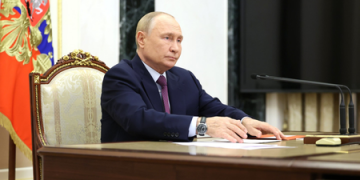Xi Jinping, elected as leader for a second time in China, is unarguably more powerful today than when he took power first to lead the Communist Party, the nation and the military in 2013.
But despite talks that now equate him with founder leader Mao Zedong, nothing yet goes to show he has matched up. A pragmatic and mature leader, Xi has given indications at last week’s party congress that he’s not intending to pick fights with the outside world but will at the same time unapologetically defend national interests. Also, on a positive note, he has said China is blazing a new trail in economic growth that developing nations could emulate.
His post-congress address to the Chinese military, asking it to be “battle-ready” cannot be ignored by geographically neighbouring nations. Although Xi has given no indication of being a war-monger in his first term, yet the activities of the People’s Liberation Army cannot be equated with his gesturing.
Notably, when fears about a war arose in the context of the Doklam stand-off between China and India, there were many who pinned hopes on the good sense and maturity of Xi as a leader. Luckily for India, he did not push.
In the just-ended party congress, the over 2,000 delegates voted unanimously to enshrine Xi’s ‘Thoughts on Socialism with Chinese Characteristics for a New Era’ into the party constitution.
Mao had been granted this honour during his lifetime and Deng Xiaoping after his demise. This, symbolically, puts Xi on par with Mao and raises feelings that he might carry on as leader for more terms.
Mao laid the foundations of Modern China at the height of a successful revolution he led to free the nation’s farmers from the stranglehold of vested interests. But, China rose on the world stage since the arrival in leadership of Deng, and it was his advocacy of the shades of free market economy – a hallmark of capitalist thought and a far cry from Communism – that effected a major turnaround in China’s economic growth.
China is now expected to be the world’s top economic power replacing the US by year 2030 if it is able to sustain the present momentum in growth. Xi ably carried forward the process, just as his predecessors Jiang Zemin and Hu Jintao too did successfully.
At the recent congress, while Xi stressed on socialism, he has also been unwavering in his support to China’s “distinctive” hybrid system in economics as also in the “party-led system” in politics.
Xi, with the wealth that China has come to possess over the past two decades, could be trusted to flex his military muscle as he has already chosen to do in the South China Sea and Western Pacific much to the concern of the US and regional powers.
While the economic growth of China has been stupendous, its military might, with the largest army in the world and flushed with cash, having a budget this year of over $150 billion, is by far the only nation that has the ability to take on the US. Although it must be admitted that it has to go a long way to go in matching military hardware with that of the US.
China’s economic growth is no more limited within its borders. Its strength can be perceptibly felt not only in Africa and Europe but also in its immediate neighbourhood. This is primarily due to OBOR, the One Belt One Road project that is Xi’s baby.
If OBOR succeeds, which seems most probable, China’s hegemony on Asia would be complete. Xi, a comparatively young politician in China’s yardstick, is certain to have a long innings at the helm.







































